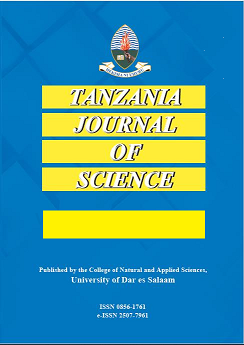Species richness and abundance estimates of small mammals in Zaraninge coastal forest in Tanzania
Abstract
A study on small mammals (<2 kg) was conducted in Zaraninge Forest, Coast Region, Tanzania, in the dry and wet seasons from 1994 to1996. The forest was found to harbour 11 small mammal species from 11 genera and seven families. There was high similarity in the number of species caught during the two seasons (Sørensen Coefficient (CCs)=0.92), implying there to be minimal migration of the species in the area. A total of 159 individuals were caught during the dry season, rodents accounting for 89.3% of the total catch and insectivores 10.7%. The most common species were Cricetomys gambianus and Grammomys dolichurus that had trap successes of 2.83 and 1.11 respectively. During the wet season 185 animals were caught, rodents accounting for 92.4% of the total catch and insectivores 7.6%. Cricetomys gambianus was significantly more abundant during the dry season. Graphiurus murinus was not caught in this season and no trend in abundance was detected for the other species. Forest specialist species included Paraxerus palliatus and Petrodromus petersi. No species was endemic to the forest, near-endemic species that occur in coastal and Eastern Arc forests included P. petersi and Beamys hindei. B. hindei also occurs in a few other East African forests. Threatened species are B. hindei and P. palliatus that are vulnerable and P. petersi that is endangered. Lepus capensis is in Appendix I of CITES list and Hystrix cristata and Mellivora capensis in Appendix III. The forest, though small is in good health and fairly well protected, therefore the species are not in danger of being locally extinct in the near future.


